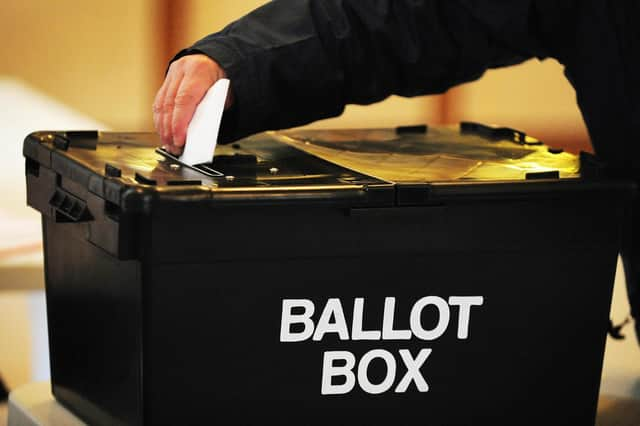Concerns thousands of people at risk of 'losing their ability to vote' in South Tyneside under new Voter ID system


Voters across the country are due to go to the polls on Thursday, May 4, to cast their ballots in the latest round of local government elections.
Local government elections in South Tyneside will see one councillor elected in each of the 18 wards in the borough.
Advertisement
Hide AdAdvertisement
Hide AdThis year, national Elections Act changes will come into force for the first time placing new requirements on councils around improving accessibility for polling station voters and new rules for those voting in person.
This includes a requirement for voters to have a valid form of photo identification which will be checked by elections staff on polling day.
The ID could be a passport, photo card driving licence or some forms of Government-issued concessionary travel passes, with a full list of valid ID types published on poll cards and on South Tyneside Council’s website.
At the most recent meeting of South Tyneside Council, councillors backed a motion raising concerns about the impact of voter ID on local democracy.
Advertisement
Hide AdAdvertisement
Hide AdThis included calls for the council’s leader and chief executive (as returning officer) to write to the Government “raising concerns about the barriers to voting that voter ID will create and the timeline for implementation”.
Other calls included more publicity around Elections Act changes and creating more opportunities for residents to understand democratic processes.
Labour councillor RIchard Porthouse launched the motion at South Shields Town Hall on March 9, 2023, and warned the Elections Act changes could impact thousands.
Cllr Porthouse said: “Current research suggests that around 4% of people may not have any form of ID or their photo ID may not be acceptable.
Advertisement
Hide AdAdvertisement
Hide Ad“This means that in May, approximately 3,200 polling station voters in South Tyneside are at risk of losing their ability to vote
“A number of key national organisations such as the Local Government Association, the Electoral Commission, the Association of Electoral Administrators and many other experts have also raised concerns about this”.
In South Tyneside, town hall bosses have previously called for voters to make a switch to postal voting or, if they don’t have a valid form of ID to vote in person, to apply to the local authority for a ‘voter authority certificate’.
Residents can attend South Shields Town Hall to make this application in person, with staff taking a photograph, or alternatively make an application via post or digitally, with an application deadline of 5pm on April 25, 2023.
Advertisement
Hide AdAdvertisement
Hide AdFor polling station voters, photocopies or digital pictures of documents will not be accepted, as the photo ID has to be the original document, and although out-of-date ID can be used, it has to reflect a “good likeness” of the person.
Councillor David Francis, Green Party Group leader, said voter ID was a “hugely expensive way to solve a problem that doesn’t really exist”.
He added that the changes also created an “additional barrier to democracy” and that certain groups were likely to be “disproportionately affected”.
Cllr Francis continued: “There are huge cost and resource implications on both local government level and a national government level and ultimately that is a cost to the taxpayer.
Advertisement
Hide AdAdvertisement
Hide Ad“It’s a problem that doesn’t really exist except in a microscopic percentage of cases, so this really is a sledgehammer to crack a nut”.
Councillor Paul Brenen, independent member, took a different view and said he was “not fully convinced” voter ID was “going to be a bad idea”
Cllr Brenen continued: “I would argue give it a try and see if these obstacles really do exist, until we have given it a chance we’ll never truly know.
“Instead I think this council’s energy should be directed at engaging the disenfranchised non-voters, people who have given up voting”.
Advertisement
Hide AdAdvertisement
Hide AdCllr Brenen noted that voter turnout in most of the borough’s wards was below 50% and that the council should focus on better ways to engage the public, including live-streaming council committees to make them “more accessible”.
Councillor Ann Best, South Tyneside Council’s ‘member champion’ for democracy, also stressed the importance of sharing key election information to residents and to promote the Elections Act changes.
The Labour councillor added: “We don’t have a choice, it is legislation, but we can certainly still lobby and raise concerns about the impact that this will have on democratic engagement in the local elections and beyond”.
Councillor John Robertson, independent member, also launched an amendment to the Labour motion to include involvement with the borough’s MPs.
Advertisement
Hide AdAdvertisement
Hide AdThis included inviting them to attend full council meetings to “demonstrate to residents of the borough how democracy works at all levels of Government”.
However this motion failed to win support across the council chamber, with the original Labour motion subsequently winning unanimous support.
Cllr Porthouse said the council already works “very closely” with local MPs who already “have their own duties representing their constituents in Westminister to consider”.
More information about the Elections Act changes and voter ID can be found on South Tyneside Council’s website.
Advertisement
Hide AdAdvertisement
Hide AdDelivery of poll cards in South Tyneside is taking place from Friday, March 24 to Thursday, March 30.
At the same time, those hoping to stand in elections will be making arrangements. The deadline for the receipt of nominations is 4pm on Tuesday, April 4.
To find out more, visit: https://www.southtyneside.gov.uk/article/16971/Local-government-elections-Thursday-4-May-2023